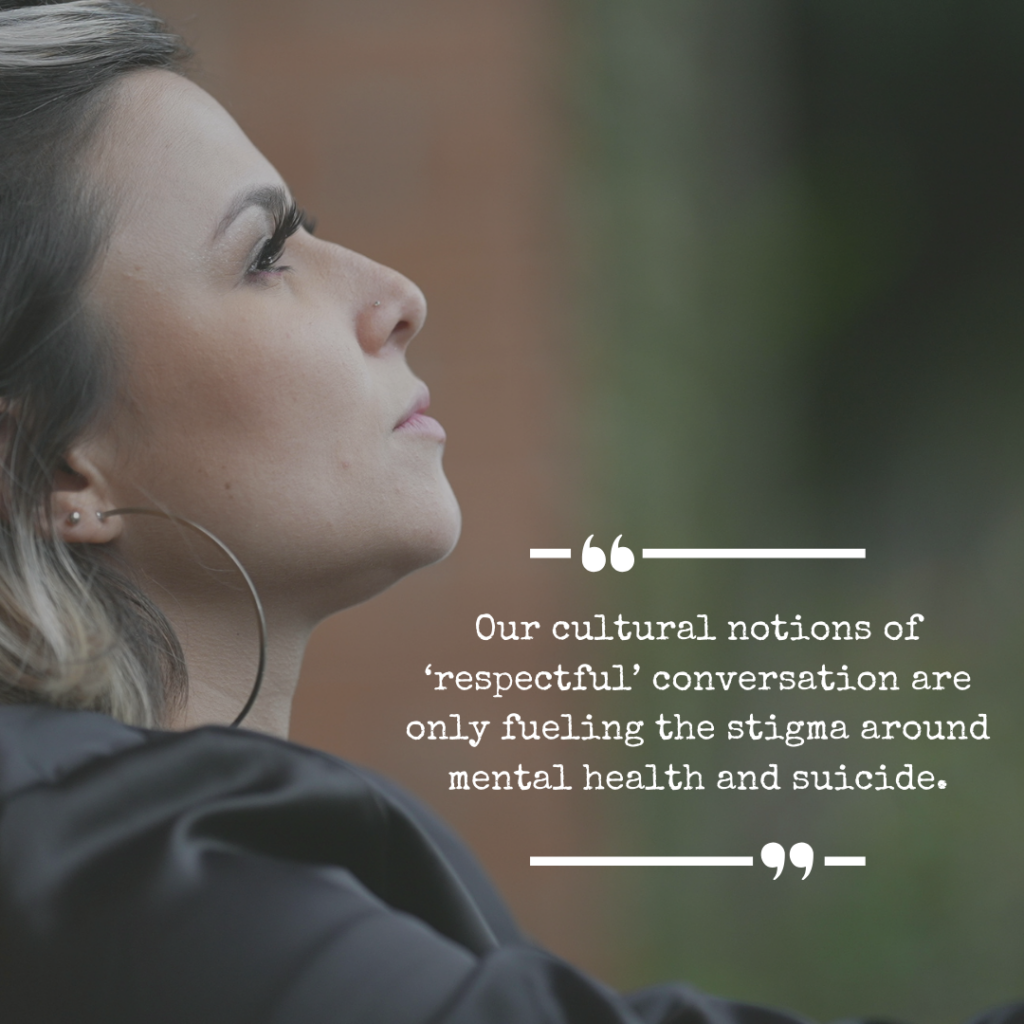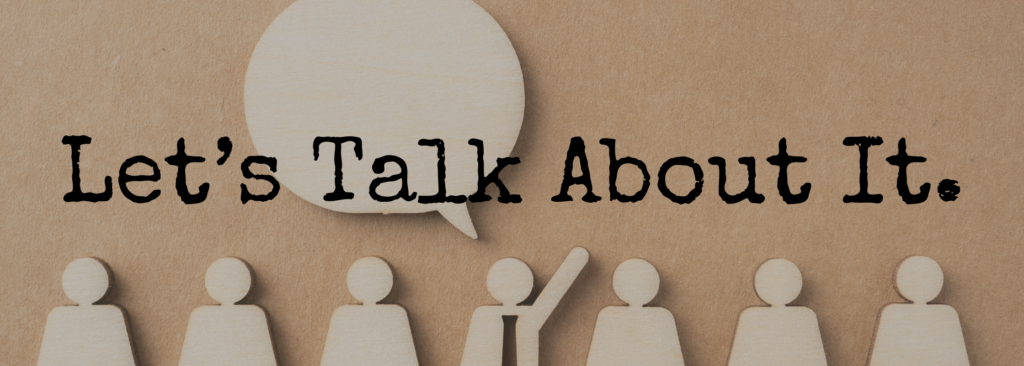Written by Bethany Lemons, CPS
Silence. Stigma. Shame. There’s just so many things that we’re “not supposed” to talk about. We’re quick to remind each other of these rules, too: avoid religion, steer clear of politics, no money talk, never focus conversations on yourself. Nothing controversial, No trauma, no grief– above all, keep it light. What about mental health? What about drugs? What about suicide? The societal message is clear: forget it. “Keep that stuff to yourself,” we’re told. “Pull yourself up by your bootstraps,” we’re urged.
 As for me, I stand firmly opposed to this notion of comfortable silence. Avoiding uncomfortable conversations has created a society where we feel like we are doing something wrong by merely entering those uncomfortable conversational spaces. Our cultural notions of “respectful” conversation are only fueling the stigma around mental health and suicide. We have to start talking about suicide. Because, frankly, our silence is killing people.
As for me, I stand firmly opposed to this notion of comfortable silence. Avoiding uncomfortable conversations has created a society where we feel like we are doing something wrong by merely entering those uncomfortable conversational spaces. Our cultural notions of “respectful” conversation are only fueling the stigma around mental health and suicide. We have to start talking about suicide. Because, frankly, our silence is killing people.
I’m a Certified Prevention Specialist here at Metro Drug Coalition, and since I’ve started working here I’ve certified hundreds of people in QPR suicide prevention. I’ve learned that, as a whole, our world doesn’t prepare us for how to have these conversations. So, if you’ve ever wondered, “what do I say, and when do I say it,” then you are not alone. I’m writing this blog post to help break down some of the basics of initiating such an important conversation.
When we talk to people we can connect them to resources, like 988 which is the suicide hotline that you can call or text at any time. We have the Tennessee Suicide Prevention Network, which is full of resources, trainings, and information. Knoxville’s McNabb Center’s 24/7 Crisis Stabilization Unit can be reached at (865) 541-6958, and Mobile Crisis can be reached at 855-CRISIS-1. People need to know that they aren’t alone.

Q: What are some of the signs that someone may be considering suicide?
A: Any change in behavior patterns could potentially be a sign that a person is considering suicide. When a person you love begins to act differently, take it as a sign that it might be time to start that conversation. Some common signs of suicidality include:
– Preoccupation with death/suicide
– Extreme life situations
– Loss of interest in work, hobbies, friends, etc.
– Putting affairs in order or giving away prized possessions
– Unexplained moodiness, anger or hostility
– Withdrawal
– Previous suicide attempts
– Relapse, especially after a period of recovery, or increased use in drugs or alcohol
– Sudden interest or disinterest in religion
– Verbal cues:
- “I’m tired of life, I just can’t go on.”
- “I just want out.”
- “I can’t” / “I quit.”
- “I wish I could go to sleep and never wake up.”
- “Everyone would be better off without me anyway.”
- “Pretty soon, you won’t have to worry about me.”
- “I wish I were dead.”
- “I am going to kill myself” / “I’m going to commit suicide.”
- “I’m going to end it all.”
- “Who cares if I’m dead anyway.”
- “If (such and such) does not happen, I’ll kill myself.”
- “I won’t be around much longer.”
See more warning signs: Warning Signs/Risks (tspn.org)
Q: When is it okay to ask about suicide? What if I put the idea in their head?
A: It is always okay to talk about suicide. Although angering a person or putting the idea in their head is a common fear that people have, what we see is that most of the time, people feel relieved that someone else sees their pain and they are not alone.
Q: How do I ask the question? How don’t I ask the question?
A: You can start the conversation by talking about some of the concerning patterns that you have noticed lately. You can ask them how they are, point out that they seem unhappy and that you care about them. Then, you want to ask directly:
– “You know, when people are as upset as you seem to be, they sometimes wish that they were dead. I am wondering if you are feeling that way, too?”
– “Are you thinking about killing yourself?”
– “Are you considering suicide?”
– “Have you been thinking about ending your life?
These questions are direct and can be hard to ask, but they are so important. We have to be willing to step into that uncomfortable space and ask these hard questions. You can practice asking these questions, because practice makes it easier. Ask yourself in the mirror so that you get used to it. Roleplay with your friends how to have the suicide conversation.
For me, I chose “are you thinking about killing yourself,” and I memorized it directly. I ask that one question every time that I have this conversation. I think that picking one way of asking the question and practicing it is important, because otherwise, our nerves can get the best of us and we can inadvertently end up asking the question in a way that reduces the impact.
Ways not to ask the question:
– “You aren’t thinking of killing yourself, are you?”
– “You wouldn’t do anything stupid, would you?”
– “Surely you’re not thinking about suicide?”
In addition to carrying stigma, these questions are dangerous because they aren’t really questions at all. They are leading, and are “asked” in a such a way that conversation is actually closed off instead of opened. I think that people usually have good intentions when they ask the question this way. When we’re reading a blogpost, it can be easy to think, “well of course I’d never ask the question that way,” but when we’re actually in a crisis situation talking to someone we love, things can be a little more difficult. When we ask the question like this it’s because we want to do the right thing and ask the question, but we aren’t necessarily ready for the conversation that follows. I want to encourage you: you can do it. You can ask the question directly, and you can have this conversation.
To learn more about asking about suicide, check out the QPR Institute or sign up for a free upcoming QPR training with Metro Drug Coalition.
If you are thinking about harming yourself or attempting suicide, you are not alone. Call or text 988, or chat online.
 Bethany serves on the Primary Prevention team at MDC. She oversees a substance misuse grant that focuses primarily on stimulant misuse prevention. She is passionate about people, data, and ideas, and aims to use the combination of these passions to create a healthy and equitable society.
Bethany serves on the Primary Prevention team at MDC. She oversees a substance misuse grant that focuses primarily on stimulant misuse prevention. She is passionate about people, data, and ideas, and aims to use the combination of these passions to create a healthy and equitable society.
Bethany is a certified CPR, AED & First Aid Instructor, and she has received her Bachelor’s of Arts in Psychology and Communication from Carson-Newman University.
